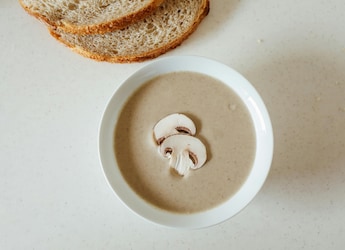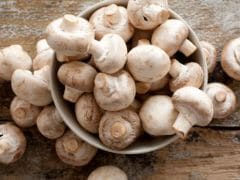There's no evidence that buying mushroom teas, coffee blends and extracts will lead to health benefits. Eating a variety of mushrooms such as shiitake and cremini along with plenty of other vegetables is better for your budget, and comes with stronger evidence for disease-fighting potential.

Mushroom tea: Health benefits of drinking mushroom tea
HIGHLIGHTS
- There are several types of adaptogenic mushrooms
- Chia mushroom grows on trees such as birch in northern climates
- Lion's mane mushroom may be beneficial for brain health
It wasn't that long ago that mushrooms were for pizza, and portobellos were considered exotic. Now purveyors of chaga, lion's mane and reishi mushrooms are promoting them as enhancements to beverages, not to food. And they're making hefty health claims in the process. These fungi are becoming increasingly popular in the form of powdered extracts, which are typically used to make mushroom teas and "coffee." In Ayurveda and traditional Chinese medicine, they're classified as "adaptogens" because they're believed to help your body "adapt" to stress. The alleged benefits include boosting energy levels, easing depression, even curing cancer.
Also read: Mushrooms, green tea lower breast cancer risk
But what does the research tell us about these claims? Here's what you need to know before adding these mushrooms-of-the-moment to your health routine.
Types of mushrooms:
There are several types of adaptogenic mushrooms, but these are the three that appear to be among the most popular and researched.
1. Chaga: This mushroom grows on trees such as birch in northern climates. Also known as clinker polypore, chaga looks like a clump of dirt with some orange areas. This mushroom has long been used as a folk remedy in Northern Europe. Chaga enthusiasts claim it can increase concentration, reduce fatigue, boost the immune system and fight cancer.
2. Lion's mane: This mushroom is full and fluffy like its namesake, with a white or golden color. It's also called yamabushitake or hou tou gu. It is used as food and medicine for a variety of ailments in China, Korea, Japan and India.
3. Reishi: This mushroom grows on decaying trees and wood. Also known as the lingzhi mushroom, it comes in several colors, although red is the most popular. Reishi mushrooms have been used in Japan and China for centuries for high blood pressure, arthritis and fighting cancer.
Although you can eat any of these mushrooms whole, chaga and reishi mushrooms have a bitter taste, so they are most easily enjoyed steeped in tea or as a powder added to other foods or beverages. Cooked lion's mane has a similar texture to lobster, so it's sometimes used in vegetarian versions of seafood recipes.
The alleged benefits of mushroom tea:
Despite the widely touted claims of health benefits and centuries of use in traditional medicine, the merits of these mushrooms haven't been proved by science. Here's what the research reveals so far:
1. Chaga: Studies in isolated cells and animals suggest that chaga may help boost the immune system and destroy cancer cells. There haven't been human studies yet to show whether this effect carries over. The same goes for the purported mental boost and blood sugar-reducing effects of chaga: At this time, not enough is known about the safety and effectiveness for people.
2. Lion's mane: This mushroom may be beneficial for brain health, although most of the research has been done on mice. Rodent studies suggest that lion's mane could prevent damage to neurons caused by beta-amyloid plaques, which occurs in Alzheimer's disease. A double-blind study of 30 Japanese adults ages 50 to 80 with mild cognitive impairment found that taking three grams of powdered lion's mane a day over four months improved mental functioning compared with a placebo. More research is necessary, however. Also note that the study was conducted at a mushroom research institute in Japan funded by a mushroom producer. Lion's mane also is purported to help manage depression and anxiety. One human study involved 30 menopausal women randomized to eat either cookies with lion's mane extract or placebo cookies without the extract for a month. At the end of the study, there was no significant difference between the two groups for changes in menopausal symptoms, sleep quality or depression. There did appear to be significant differences in self-reports of palpitations and motivation favoring the lion's mane group. Only animal studies have looked at lion's mane's impact on diabetes, ulcers, Crohn's disease, nervous system injuries, liver health, heart disease, and cancer prevention and treatment.
3. Reishi: Studies on its health benefits have had mixed results. A small study of 10 people found that taking a reishi mushroom supplement for 10 days increased the levels of some antioxidants in the blood, which suggests potential heart health benefits. A follow-up study of 18 people taking reishi mushroom for a month didn't replicate these results. Research also shows mixed results for the effects of reishi mushrooms on blood sugar and cholesterol levels, with one study finding that reishi mushrooms led to lower blood sugar and cholesterol levels, and another study finding no significant impact. There isn't enough evidence involving reishi mushrooms and cancer to recommend them as a first-line or alternative treatment. Current research suggests that when study participants undergoing cancer treatment took reishi mushroom supplements alongside their chemotherapy and/or radiation, the effectiveness of their treatments increased. However, some participants experienced insomnia and nausea.
Also read: Mushrooms, green tea lower breast cancer risk
The risks associated with mushroom tea:
Although these mushrooms may be "natural," that doesn't make them harmless. For example, chaga is high in oxalates, compounds that reduce nutrient absorption and could damage the kidneys in large amounts. Any of these mushrooms could interact with medications, supplements or herbs you're taking. Always talk to your doctor before trying a new herb or supplement.
The bottom line
There's no evidence that buying mushroom teas, coffee blends and extracts will lead to health benefits. Eating a variety of mushrooms such as shiitake and cremini along with plenty of other vegetables is better for your budget, and comes with stronger evidence for disease-fighting potential. All varieties of mushrooms are low in calories, contain some vitamin D, may have gut-health benefits and give a rich umami flavor to your meals. My money is always on a variety of whole foods over single supplements.
Also read: Top 4 Adverse Effects Of Shiitake Mushrooms
DoctorNDTV is the one stop site for all your health needs providing the most credible health information, health news and tips with expert advice on healthy living, diet plans, informative videos etc. You can get the most relevant and accurate info you need about health problems like diabetes, cancer, pregnancy, HIV and AIDS, weight loss and many other lifestyle diseases. We have a panel of over 350 experts who help us develop content by giving their valuable inputs and bringing to us the latest in the world of healthcare.














